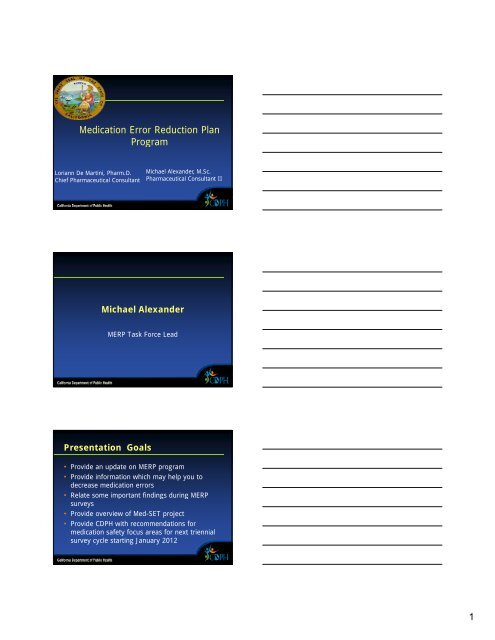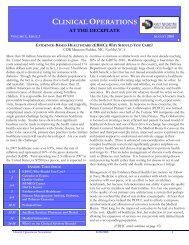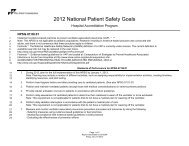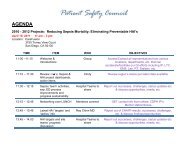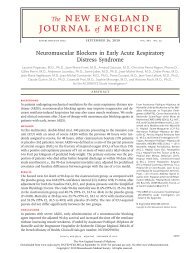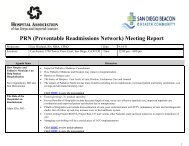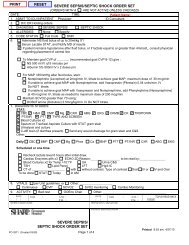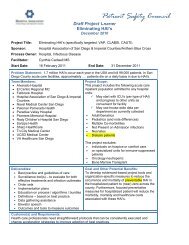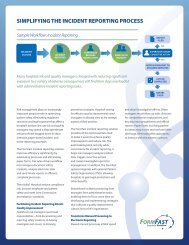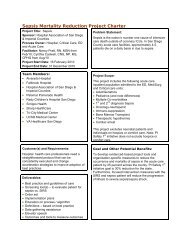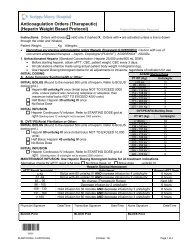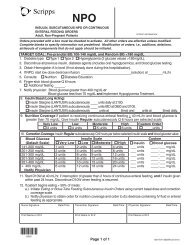1 Medication Error Reduction Plan Program - Patientsafetycouncil.org
1 Medication Error Reduction Plan Program - Patientsafetycouncil.org
1 Medication Error Reduction Plan Program - Patientsafetycouncil.org
Create successful ePaper yourself
Turn your PDF publications into a flip-book with our unique Google optimized e-Paper software.
<strong>Medication</strong> <strong>Error</strong> <strong>Reduction</strong> <strong>Plan</strong><br />
<strong>Program</strong><br />
Loriann De Martini, Pharm.D.<br />
Chief Pharmaceutical Consultant<br />
Michael Alexander, M.Sc.<br />
Pharmaceutical Consultant II<br />
Michael Alexander<br />
MERP Task Force Lead<br />
Presentation Goals<br />
• Provide an update on MERP program<br />
• Provide information which may help you to<br />
decrease medication errors<br />
• Relate some important findings during MERP<br />
surveys<br />
• Provide overview of Med-SET project<br />
• Provide CDPH with recommendations for<br />
medication safety focus areas for next triennial<br />
survey cycle starting January 2012<br />
1
MERP Survey Summary<br />
January 2009 – December 2011<br />
• 374 – Hospitals to be surveyed<br />
• 368 – Exited surveys (98 %)<br />
• 346 – Survey data received (94 %)<br />
• 323 – Noted deficiencies (93 %)<br />
• 23 – In compliance ( 7 %)<br />
Data as of 01/23/2012<br />
Common Deficiencies<br />
• 68 % - Develop and implement P&Ps for safe<br />
and effective use of medications [CCR 70263(c)(1)]<br />
• 63 % - Conduct an annual review to assess<br />
effectiveness of the implementation of MERP<br />
[HSC 1339.63 (e)(2)]<br />
• 46 % - Identify weakness or deficiencies that<br />
could contribute to errors [HSC 1339.63 (e)(1)]<br />
• 45 % - Include a multidisciplinary process to<br />
regularly analyze all errors [HSC 1339.63 (e)(6)]<br />
Issues:<br />
• Fentanyl patches<br />
• Droperidol<br />
• Insulin<br />
• IV infusion devices<br />
• Smart pumps; PCAs<br />
2
Issues:<br />
• Automated Dispensing Cabinets<br />
• Discrepancies, overrides, profiling (e.g., Radiology,<br />
PACU, ED)<br />
• Emergency medications (MH, carts, boxes)<br />
• Sealed, list of meds, exp. date<br />
• Refrigerators (storage); warmers in OR<br />
Issues:<br />
• Lack of policies and procedures<br />
• Policies and procedures not followed<br />
• Recent medication deaths: heparin, morphine,<br />
warfarin, fentanyl<br />
Issues:<br />
• Drawing up emergency medications correctly<br />
• Preprinted orders – include parameters for dose<br />
• Preprinted orders – include parameters for dose<br />
changes<br />
(e.g., norepinephrine, nitroprusside)<br />
3
Expired Drugs<br />
• Operating room areas<br />
• Transport boxes, kits<br />
• Emergency department (succinylcholine?)<br />
• Clinics<br />
• Unit inspections<br />
Malignant Hyperthermia<br />
• Do nurses, pharmacists, physicians know how<br />
to treat MH?<br />
• Do nurses, pharmacists, physicians know where<br />
to get drugs to treat MH?<br />
• Do you have all of the MHAUS recommended<br />
drugs in your cart?<br />
Loriann DeMartini<br />
Chief Pharmaceutical Consultant<br />
4
Department of Health and<br />
Human Services<br />
OFFICE OF<br />
INSPECTOR GENERAL<br />
ADVERSE EVENTS IN<br />
HOSPITALS:<br />
NATIONAL INCIDENCE<br />
AMONG MEDICARE<br />
BENEFICIARIES<br />
11/2010<br />
How the numbers add up<br />
• 15,000<br />
• 180,000<br />
• 44<br />
• 324<br />
• Number 1 cause of adverse events<br />
• 50<br />
Department of Health and<br />
Human Services<br />
OFFICE OF<br />
INSPECTOR GENERAL<br />
HOSPTIAL INCIDENT<br />
REPORTING<br />
SYSTEMS<br />
DO NOT CAPTURE<br />
MOST PATIENT HARM<br />
January 2012<br />
5
Office of Inspector General Report<br />
• 14% of events are reported<br />
• Reason – don’t see the outcome as an error<br />
• 11% of events that led to death reported<br />
• <strong>Medication</strong> = 38% of adverse events<br />
• 13% reported<br />
• Changes in mental status (delirium); excessive<br />
bleeding, hypoglycemic event<br />
Can <strong>Medication</strong> Safety System<br />
Vulnerabilities be identified<br />
proactively and objectively?<br />
<strong>Medication</strong> Safety Event Tracking<br />
Med SET<br />
Launched September 2011<br />
6
Med SET<br />
• Objectives/Goals:<br />
• Collect, quantify, and analyze medication safety data.<br />
• Goals:<br />
• Identify medication safety system vulnerabilities and<br />
their trends<br />
• Use Med SET data to inform and educate internal and<br />
external providers on medication safety issues<br />
Med SET<br />
• Data extracted from Statement of Deficiencies<br />
• Long term care and hospitals<br />
• Used MERP defined systems or procedures and<br />
expanded - internal use only<br />
• 12 categories with 85 sub-categories<br />
• Compare different facility types<br />
• Present level of harm<br />
MERP<br />
1. Prescribing<br />
2. Prescription order<br />
communication<br />
3. Product labeling<br />
4. Packaging and<br />
nomenclature<br />
5. Compounding<br />
6. Dispensing<br />
7. Distribution<br />
8. Administration<br />
9. Education<br />
10.Monitoring<br />
11.Use<br />
Med SET<br />
1. Prescribing<br />
2. Prescription order communication<br />
3. Product labeling, packaging and<br />
nomenclature<br />
4. Compounding<br />
5. Dispensing<br />
6. Distribution<br />
7. Administration<br />
8. Monitoring<br />
9. Competency<br />
10.Use<br />
11.Technology<br />
12.Transitions in care<br />
7
Med SET: Distribution<br />
1. Expired, Unusable, or Recalled<br />
2. Controlled Substances Accountability<br />
3. High Risk/High Alert<br />
4 Automated Dispensing Cabinet (ADC)<br />
4. Automated Dispensing Cabinet (ADC)<br />
5. Drug Storage<br />
6. Accessibility of Drugs<br />
7. Drug Storage Temperature<br />
8. Emergency Kits and Carts<br />
8
Med SET: Next Steps<br />
• Seek input from external stakeholders – Focus<br />
Groups<br />
• Finalize process<br />
• Disseminate findings<br />
• Develop recommendations to reduce system<br />
vulnerabilities based on scope and severity<br />
MERP <strong>Program</strong><br />
A story of collaboration<br />
Collaboration: Its working…So<br />
what's next?<br />
What can we do to help you<br />
reduce/eliminate medication errors?<br />
9


